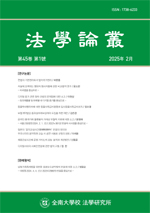온라인 중개거래 플랫폼의 거래상 우월적 지위에 대한 소고 - 서울고등법원 2024. 2. 1. 선고 2022누36102 판결의 시사점을 중심으로
A Study on the Concept of Superior Bargaining Position in Online Intermediary Platforms
- 전남대학교 법학연구소
- 법학논총
- 제45권 제1호
-
2025.02157 - 189 (33 pages)
-
DOI : 10.38133/cnulawreview.2025.45.1.157
- 165

티몬·위메프 판매대금 미정산 사태로 인하여 공정위는 대규모유통업법의 개정을 통해 일정 규모의 온라인 중개거래 플랫폼을 대규모유통업자로 의제하여 판매대금 정산 등에 대한 각종 의무를 부과하는 방안을 논의 중이다. 이러한 온라인 중개거래 플랫폼 중심의 개정 논의에는 여러 문제점이 제기될 수 있지만, 가장 중요하면서 근본적인 문제는 온라인 중개거래 플랫폼의 거래상 우월적 지위 인정에 대한 부분이다. 공정거래법상 불공정거래행위 중 거래상 지위 남용행위에 대한 특별법적 지위를 가진 대규모유통업법이 적용되려면 거래상 우월적 지위가 인정되어야 하고, 이로써 공정거래법보다 더 강력한 제재 규범인 대규모유통업법의 적용을 받게 되어 거래상대방인 납품업자 등은 높은 수위의 행정적, 형사적 규제 수단을 통한 보호를 받을 수 있게 된다. 이처럼 거래상 우월적 지위 존부에 대한 판단은 매우 중요한 대규모유통업법 적용의 전제임에도 불구하고 실무상 공정위나 법원은 “상대적으로 우월한 지위 또는 적어도 상대방의 거래활동에 상당한 영향을 미칠 수 있는 지위”라는 다소 모호한 개념에 의존해왔다. 또한 이러한 개념을 바탕으로 사실상 대규모유통업자에 해당하기만 하면 납품업자의 형태나 거래 상품의 특성 등에 대한 추가적인 논의 없이 거래상 우월적 지위를 쉽게 인정하는 경향도 있어서 사실상 공정위가 관련 위반행위를 심사할 때 대규모유통업자의 거래상 우월적 지위를 추정해왔다고 해도 과언이 아니다. 본고는 거래상 우월적 지위의 판단기준이 온라인 중개거래 플랫폼에 적용되는 경우 문제점은 없는지, 티몬·위메프 판매대금 미정산 사태를 방지하기 위한 대규모유통업법의 개정이 타당한지를 검토하기 위하여, 공정거래법의 거래상 지위와 대규모유통업법의 거래상 우월적 지위를 비교한 후 온라인 대규모유통업자의 거래상 우월적 지위가 논의된 최근 판결인 서울고등법원 2024. 2. 1. 선고 2022누36102 판결을 살펴보고 온라인 중개거래 플랫폼에의 시사점을 모색하기로 한다.
The recent financial settlement crisis involving TMON and WeMakePrice has reaffirmed the importance of ensuring financial soundness and establishing a transparent settlement system for online platforms. In response, the Korea Fair Trade Commission (KFTC) is considering amending the Act on Fair Transactions in Large Retail Business to deem online intermediary platforms as large retail business entities, thereby imposing various obligations related to sales revenue settlement. While this amendment, centered on online intermediary platforms, raises several concerns, the most fundamental issue is the recognition of superior bargaining position held by online intermediary platform operators. For the Act on Fair Transactions in Large Retail Business, which serves as a special law governing unfair trade practices under the Fair Trade Act, to apply, such a position must first be acknowledged. If recognized, this classification would subject platform operators to stricter regulatory measures than those imposed under the Fair Trade Act, thereby granting suppliers and other transaction counterparts stronger protection through stringent administrative and criminal sanctions. Despite the critical importance of determining whether a superior bargaining position exists, both the KFTC and the courts have traditionally relied on a somewhat ambiguous standard, defining it as a “relatively superior position” or at least one capable of significantly influencing the counterparty’s business activities.” Furthermore, in practice, once an entity qualifies as a large retail business entity, the KFTC and the courts have tended to readily recognize its superior bargaining position without further assessing the characteristics of suppliers or the nature of traded goods. This suggests a de facto presumption of superior bargaining position in cases involving large retail business entities. This study examines whether the criteria for determining superior bargaining position in offline retail markets can be directly applied to the online retail sector. To do so, it compares the concept of bargaining position under the Fair Trade Act with the superior bargaining position under the Act on Fair Transactions in Large Retail Business and analyzes the implications of the recent Seoul High Court ruling (2024Nu36102, rendered on February 1, 2024) that addressed this issue in the context of the online retail market.
Ⅰ. 서론
Ⅱ. 대규모유통업법의 주요 내용 및 개정 논의
Ⅲ. 공정거래법의 거래상 지위 및 대규모 유통업법의 거래상 우월적 지위 비교
Ⅳ. 온라인 대규모유통업자의 거래상 우월적 지위와 온라인 중개거래 플랫폼에의 적용 가능성
Ⅴ. 결론
(0)
(0)